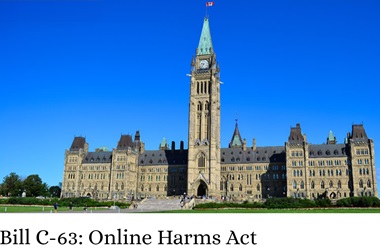
Justice Minister Arif Virani presented the Online Harms Act, saying it will combat hate speech.
The Liberal government introduced Bill C-63 to enact the Online Harms Act February 26.
A CBC News article stated:
The federal government introduced late last month its long-awaited Online Harms Bill, which proposes to police seven categories of harmful content online, including content used to bully a child, content that sexualizes children or victims of sexual violence, content that incites violence or terrorism and hate speech.
Critical response has been widespread.
For example, while commentator Terry Glavin acknowledged in the National Post that “The measures outlined in Bill C-63 that pertain to the duties of social media platforms to protect children from pornography and from threats and intimidation are both immediately necessary and long overdue.”
But he also “offer[ed] a glimpse of the delightfully dystopian opportunities that could open up with a Trudeau-appointed online safety commission keeping an eye on the way Canadians talk about the affairs of the world,” and asked, “Who would trust a digital safety commission appointed by this government?”
The Justice Centre for Constitutional Freedoms posted a comment titled ‘Online Harms Act Threatens Free Expression in Canada.
And the Canadian Civil Liberties Association urged “substantial amendments” to the Act, beginning its response with these words:
Our preliminary read raises several serious concerns. While the CCLA endorses the declared purposes of upholding public safety, protecting children, and supporting marginalized communities, our initial assessment reveals that the bill includes overbroad violations of expressive freedom, privacy, protest rights, and liberty. These must be rectified before the bill is passed into law.
One troubling aspect of Bill C-63 is the vast authority bestowed upon a newly established body, comprising government appointees, to interpret the law, make up new rules, enforce them, and then serve as judge, jury, and executioner. Granting such sweeping powers to one body undermines the fundamental principle of democratic accountability.
Furthermore, the bill’s provisions which include sweeping new search powers of electronic data with no warrant requirement, pose significant threats to privacy rights. The bill provides for unacceptable intrusions into individuals’ digital lives.
EFC’s report
 The Evangelical Fellowship of Canada (EFC) released a measured eight-page initial report March 20. Following are the Introduction, Overview and Conclusion:
The Evangelical Fellowship of Canada (EFC) released a measured eight-page initial report March 20. Following are the Introduction, Overview and Conclusion:
- Introduction
On February 26, the government tabled Bill C-63. This is a long and complex bill. We are studying it carefully.
We approach this bill, as we do all laws and policies, through biblical principles. The commandments to love God and to love our neighbour can be fleshed out in principles such as caring for those who are vulnerable, upholding human dignity, and advocating for religious freedom.
Strong concerns have been expressed about the impact of this bill on expression, including expression of religious beliefs. We believe holding religious beliefs and acting on them (including, but not only, through expression) is of ultimate importance. This is an important part of our consideration as we examine this bill and the impact it could have.
This bill would make numerous significant changes to the law, and there are valid and serious concerns and questions about it that need to be answered and addressed. And precisely because it is broad ranging, we need to look at it carefully, critically and soberly.
- Overview
In broad strokes, the bill has three main sections. The first section is the Online Harms Act which would impose responsibilities on online platforms and social media services.
It would require online platforms, to address seven categories of harmful content related to non-consensual intimate content, content that sexually victimizes children or revictimizes a survivor, and content that foments hatred or incites violence. It would also require platforms – upon becoming aware of content that sexually victimizes a child or revictimizes a survivor, or of intimate content uploaded without consent – to make this content inaccessible in Canada within 24 hours.
It would create a Digital Safety Commission to ensure online platforms are following their responsibilities. The Digital Safety Commission would receive complaints and be able to order the removal of content that sexually victimizes a child or revictimizes a survivor, or intimate content distributed without consent. It would be able to fine online platforms for breaches of the new law.
It would also create a Digital Safety Ombudsperson who would support social media users and advocate for the public interest in relation to online safety. A Digital Safety Office of Canada would be set up to support both the Digital Safety Commission and the Ombudsperson.
The second section of Bill C-63 would make changes to the Criminal Code. It would add a definition of hatred and a new crime of “committing an offence that is motivated by hatred” with a possible maximum sentence of life in prison. It would increase the maximum sentences for current hate propaganda offences and add hate propaganda and hate crime offences to the current peace bond provisions. The peace bond provisions allow for pre-emptive, time-limited restrictions on a person a judge deems likely to commit an offence, upon an application approved by the Attorney General.
The third section would amend the Canadian Human Rights Act. Bill C-63 would add communicating hate speech as a discriminatory practice, bringing back a revised version of the old ‘section 13’ that was repealed in 2014. This would allow a person or a group to make a complaint to the Canadian Human Rights Commission about online speech that is “likely to foment detestation or vilification of an individual or group of individuals on the basis of a prohibited ground of discrimination.”
The revised s. 13 provision allows complainants to be anonymous if there is an alleged risk they will be subject to threats, intimidation or discrimination. As with all human rights law, a lower evidentiary bar would apply than for existing Criminal Code violations (which require proof beyond a reasonable doubt and that a person “willfully” promoted hatred). Instead, the Tribunal would be empowered to order compensation of up to $20,000 to be awarded to the complainant, and fines of up to $50,000 to be paid to the government.
There is a fourth section to the bill which strengthens the current law on mandatory reporting of child pornography by internet service providers. We do not consider these amendments to be of concern and will not be addressing them here.
- Conclusion
We believe that content related to the sexual victimization of children, revictimization of a survivor, and the non-consensual sharing of intimate images, must be dealt with expeditiously. We will be looking closely at the provisions related to the Digital Safety Commission
We have serious concerns and reservations about the inclusion of certain types of alleged hate speech within Part One of the Bill, some of the proposed amendments to the Criminal Code in Part Two and in particular, the re-enactment of s. 13 of the Canadian Human Rights Act in Part Three. Because of the risks to freedom of expression, those sections require particularly careful consideration of freedom of expression, significant amendments, and should proceed much more slowly, if at all.
We will continue to study the bill
Go here for the whole report.
Jack Taylor wrote an article about ‘The Hidden Dangers of Bill 63’ for Light Magazine, posted April 2.
